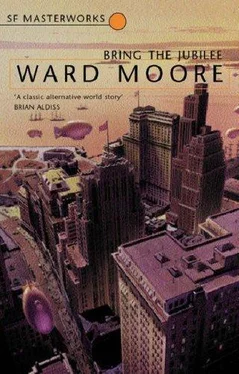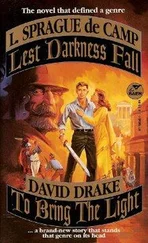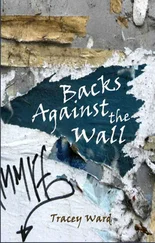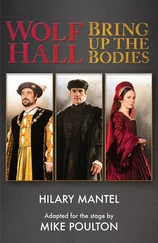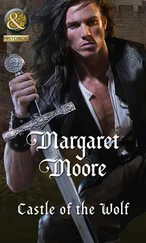She spoke of responsibility and duty as though they were measurable quantities, but the gentler parts of such equations, the factors of affection and pity, were never mentioned. I don't want to give the impression that ours was a particularly puritanical family; I know our neighbors had of necessity much the same grim outlook. But I felt guiltily vulnerable, not merely on the score of wanting more schooling, but because of something else which would have shocked my mother beyond forgiveness.
My early tussles with Mary McCutcheon had the natural consequences, but she had found me a too-youthful partner and had taken her interests elsewhere. For my part I now turned to Agnes Jones, a suddenly alluring young woman grown from the skinny kid I'd always brushed away. Agnes sympathized with my aspirations and encouraged me most pleasantly. However, her specific plans for my future were limited to marrying her and helping her father on his farm, which seemed no great advance over what I could look forward to at home.
And there I was certainly no asset; I ate three hearty meals a day and occupied a bed. I was conscious of the looks and smiles which followed me. A great lout of seventeen, too lazy to do a stroke of work, always wandering around with his head in the clouds or lying with his nose stuck in a book. Too bad; and the Backmakers such industrious folk, too. I could feel what the shock of my behavior with Agnes added to my idleness would be to my mother.
Yet I was neither depraved nor very different from the other youths of Wappinger Falls, who not only took their pleasures where they found them, but often more forcibly than persuasively. I did not analyze it fully or clearly, but I was at least to some extent aware of the essentially loveless atmosphere around me. The rigid convention of late marriages bred an exaggerated respect for chastity which had two sides: sisters' and daughters' honor was sternly avenged with no protest from society, and undiscovered seduction produced that much more gratification. But both retribution and venery were somewhat mechanical; they were the expected rather than the inescapable passions. Revivalists—and we country people had a vast fondness for those itinerants who came periodically to castigate us for our sins—denounced our laxity and pointed to the virtues of our grandparents and great-grandparents. We accepted their advice with such modifications as suited us, which was not at all what they intended.
And this was how I took my mother's admonition to be my own man. What debts I owed her and my father seemed best discharged by relieving them of the burden of my keep, since I was clearly not fitting myself to reverse the balance. The notion that there was an emotional obligation on either side hardly occurred to me; I doubt if it did to them. Toward Agnes Jones I felt no debt at all.
A few months after my seventeenth birthday I packed my three most cherished books in my good white cotton shirt and, having bade a most romantic good-bye to Agnes, one which would certainly have consummated her hopes had her father come upon us, I left Wappinger Falls and set out for New York.
II. OF DECISIONS, MINIBILIES, AND TINUGRAPHS
I thought I could do the walk of some eighty miles in four days, allowing time to swap work for food, supposing I found farmers or housewives agreeable to the exchange. June made it no hardship to sleep outdoors, and the old post road ran close enough to the Hudson for any bathing I might care to do. The dangers of the trip were part of the pattern of life in the United States in 1938. I didn't particularly fear being robbed by a roving gang for I was sure organized predators would disdain so obviously unprofitable a prey, and individual thieves I felt I could take care of, but I was not anxious to be picked up as a vagrant by any of the three police forces, national, state, or local. As a freeman I was more exposed to this chance than an indent would be, with a workcard on his person and a company behind him. A freeman was fair game for the constables, state troopers, or revenuers to recruit, after a perfunctory trial, into one of the chain gangs upon whom the roads, canals, and other public works were dependent.
Some wondered why the roads were so bad in spite of all this apparent surplus of labor and were dubious of the explanation that surfacing was expensive and it was impossible to maintain unsurfaced highways in good condition. Only the hint that prisoners had been seen working around the estates of the great Whig families or had been lent to some enterprise operated by foreign capital brought knowing nods.
At seventeen possible disasters are not brooded over. I resolved to be wary, and then dismissed thoughts of police, gangs, and all unpleasantness. The future was mine to make as my mother had insisted, and I was taking the first steps in shaping it.
I started off briskly, passing at first through villages long familiar; then, getting beyond the territory I had known all my life, I slowed down often enough to gaze at something new and strange, or to wander into wood or pasture for wild strawberries or early blueberries. I covered less ground than I had intended by the time I found a farmhouse, after inquiring at several others, where the woman was willing to give me supper and even let me sleep in the barn in return for splitting a sizable stack of logs into kindling and milking two cows.
Exercise and hot food must have counteracted the excitement of the day, for I fell asleep immediately and didn't waken till quite a while after sunup. It was another warm, fine morning; soon the post road led, not between shabby villages and towns or struggling farms, but past the stone or brick walls of opulent estates. Now and then I caught a glimpse between old, well-tended trees of magnificent houses either a century old or built to resemble those dating from that prosperous time. I could not but share the general dislike for the wealthy Whigs who owned these places, their riches contrasting with the common poverty and deriving from exploitation of the United States as a colony, but I could not help enjoying the beauty of their surroundings.
The highway was better traveled here also; I passed other walkers, quite a few wagons, a carriage or two, several peddlers, and a number of ladies and gentlemen on horseback. This was the first time I'd seen women riding astride, a practice shocking to the sensitivities of Wappinger Falls which also condemned the fashion, imported from the Chinese Empire by way of England, of feminine trousers. Having learned that women were bipedal, both customs seemed sensible to me.
I had the post road to myself for some miles between turns when I heard a commotion beyond the stone wall to my left. This was followed by an angry shout and shrill words impossible to distinguish. My progress halted, I instinctively shifted my bundle to my left hand as though to leave my right hand free for defence, but against what I had no idea.
The shouts came closer; a boy of about my own age scrambled frantically over the wall, dislodging some of the smaller lichen-covered rocks on top and sending them rolling into the ditch. He looked at me, startled, then paused for a long instant at the road's edge, undecided which way to run.
He was barefoot and wore a jute sack as a shirt, with holes cut for his arms, and ragged cotton pants. His face was little browner than my own had often been at the end of a summer's work under a burning sun.
He came to the end of indecision and started across the highway, legs pumping high, head turned watchfully. A splendid tawny stallion cleared the wall in a soaring jump, his rider bellowing, “There you are, you damned black coon!”
He rode straight for the fugitive, quirt upraised, lips thickened, and eyes rolling in rage. The victim dodged and turned; in no more doubt than I that the horseman meant to ride him down. He darted by me, so close I heard the labored rasp of breathing.
Читать дальше
